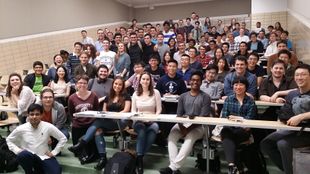1617-257/About This Class
Crucial Information
Agenda: Adult-Level Calculus; especially [math]\displaystyle{ \int_M d\omega=\int_{\partial M}\omega }[/math].
Instructor: Dror Bar-Natan, drorbn@math.toronto.edu (no math over email!), Bahen 6178, 416-946-5438. Office hours: by appointment.
Classes: Mondays, Wednesdays, and Fridays 2-3PM at MC 254 (fall semester) and at RS 211 (winter/spring).
Teaching Assistants: Ahmed J. Zerouali (ahmed.zerouali@mail.utoronto.ca) and Jeff Im (jim@math.toronto.edu). Jeff's Office hours: Fridays 11:30-12:30 at the lounge on the 10th floor of 215 Huron.
Tutorials: Wednesdays 5-6PM with Ahmed J. Zerouali at AB 107 and Thursdays 4-5PM with Jeff Im at BA2185.
URL: http://drorbn.net/1617-257.
Text Book(s)
Our main text book will be Analysis on Manifolds by James R. Munkres; it is a required reading. You may also wish to look at Spivak's Calculus on Manifolds.
Abstract
Taken from the Faculty of Arts and Science Calendar:
Topology of [math]\displaystyle{ R^n }[/math]; compactness, functions and continuity, extreme value theorem. Derivatives; inverse and implicit function theorems, maxima and minima, Lagrange multipliers. Integration; Fubini's theorem, partitions of unity, change of variables. Differential forms. Manifolds in [math]\displaystyle{ R^n }[/math]; integration on manifolds; Stokes' theorem for differential forms and classical versions.
- Prerequisite: MAT157Y1, MAT240H1, MAT247H1
- Distribution Requirement Status: Science
- Breadth Requirement: The Physical and Mathematical Universes (5)
Plan
If we don't do [math]\displaystyle{ \int_M d\omega=\int_{\partial M}\omega }[/math], we've failed. So we'll do [math]\displaystyle{ \int_M d\omega=\int_{\partial M}\omega }[/math] no matter what it takes. The base plan is to go over the text book skipping almost nothing at a pace of a little less than two sections a week (and then add just a bit). If we lag, we'll skip and take shortcuts. Yet [math]\displaystyle{ \int_M d\omega=\int_{\partial M}\omega }[/math] we will do.
Warning and Recommendation
This will be a tough class, not for the faint of heart. It's about "adult-level calculus": I will make every effort to make it understandable, but certain parts of the material require a very high level of mathematical sophistication. If you are not ready to put in the tremendous effort it takes to reach this level of sophistication, do yourself a favour and take another class. Every bit of this class absolutely makes sense. But you'll have to think hard at all times, and be ready to repeatedly adjust your perspective, to see that this is so. Don't let go! If you'll fall behind you'll find it nearly impossible to catch up. This actually does not mean "do your homework in time" (highly recommended anyway). It means "do your deep thinking in time".
Wiki
The class web site is a wiki, as in Wikipedia - meaning that anyone can and is welcome to edit almost anything and in particular, students can post notes, comments, pictures, whatever. Some rules, though -
- This wiki is a part of my (Dror's) academic web page. All postings on it must be class-related (or related to one of the other projects I'm involved with).
- You must login to edit. To get an account, email me the class you are taking (1617-257), your preferred login name, your real name and your email address if different from the address you are writing from.
- Criticism is fine, but no insults or foul language, please.
- I (Dror) will allow myself to exercise editorial control, when necessary.
- The titles of all pages related to this class must begin with "1617-257/" or with "1617-257-", just like the title of this page. Same for all filenames of files uploaded in relation with this class.
- If you create a page or upload a file and it is not linked from the 1617-257 main page, or from some other visible page as appropriate, then nobody will ever be able to use your page/file, and hence I will remove it.
- For most 1617-257 pages, it is a good idea to put a line containing only the string {{1617-257/Navigation}} at the top of the page. This template inserts the class' "navigation panel" on the top right of the page.
- To edit the navigation panel itself, click on the word "Navigation" on the upper right of the panel. Use caution! Such edits affect many other pages! Note that due to page-caching, such edits take some time to propagate to the pages that include the navigation panel. To force immediate propagation to a given page, reload that page with the string "&action=purge" (meaning: "purge cached version") appended to the page's URL.
- In as much as possible, try to keep the same formatting conventions throughout all the pages for this class. This makes reader's life easier.
- Neatness matters! Material that is posted in an appealing manner will be read more, and thus will be more useful. In particular, low-contrast cellphone pictures of notes in unreadable handwriting are less useful than high-quality scans of notes in excellent handwriting, these are less useful than well-typeset PDF files, and these are less useful than wiki-typeset pages (that can be edited and improved by others).
- Some further editing help is available at Help:Contents.
Marking Scheme
There will be three term test (each worth 15% of the total grade) and a final exam (40%), as well as about 20 homework assignments (15%).
The Term Tests
The term tests will take place outside of class time at 5-7PM on Tuesday November 1st at BI 131, on Tuesday January 17 at EX 300, and on Tuesday March 14 at EX 300. There will be no make-up term tests. If you miss a term test without providing a valid reason (for example, a doctor’s note) within one week of the test you will receive a mark of 0 on that term test. If you miss one term test for a valid reason, the the weight of the other two term tests will be increased to 22.5% each. If you miss two term tests for valid reasons, the the weight of the remaining term test will be increased to 30%, HW to 20%, and the final to 50%. You cannot miss all terms tests and receive a mark for this class.
Homework
About 19 assignments will be posted on the course web page approximately on the weeks shown in the class timeline, usually on Fridays. They will usually be due a week later and they will be (at least partially) marked by the TAs. All students (including those who join the course late) will receive a mark of 0 on each assignment not handed in; though to account for sick days and other unusual circumstances, your worst 4 assignments will not count towards your HW grade. I encourage you to discuss the assignments with other students or browse the web, so long as you do at least some of the thinking on your own and you write up your own solutions. Remember that cheating is always possible and may increase your homework grade a bit. But it will hurt your appreciation of yourself, your knowledge, and your exam grades a lot more.
Good Deeds
Students will be able to earn up to 25 "good deeds" points throughout the year for doing services to the class as a whole. There is no pre-set system for awarding these points, but the following will definitely count:
- Drawing a beautiful picture to illustrate a point discussed in class and posting it on this site.
- Taking class notes in nice handwriting, scanning them and posting them here.
- Typing up or formatting somebody else's class notes, correcting them or expanding them in any way.
- Writing an essay on expanding on anything mentioned in class and posting it here; correcting or expanding somebody else's article.
- Setup useful external resources: A web-based discussion forum? A Q/A site?
- Doing anything on our 1617-257/To do list.
- Any other service to the class as a whole.
Good deed points will count towards your final grade! If you got [math]\displaystyle{ n }[/math] of those, they are solidly yours and the above formula for the final grade will only be applied to the remaining [math]\displaystyle{ 100-n }[/math] points. So if you got 25 good deed points (say) and your final grade is 80, I will report your grade as [math]\displaystyle{ 25+80(100-25)/100=85 }[/math]. Yet you can get an overall 100 even without doing a single good deed.
Important. For your good deeds to count, you must do them under your own name. So you must set up an account for yourself on this wiki and you must use it whenever you edit something. I will periodically check Recent changes to assign good deeds credits. Those credits will be made public (good deeds are public as a whole) towards the end of the course, at 1617-257/Register of Good Deeds.
Important. The good deed points are an extra, a bonus, a treat. Very few will get many, and you should not count on them as a substitute for doing class work.
Class Photo
To help me learn your names, I will take a class photo on Friday of the third week of classes. I will post the picture on the class' web site and you will be required to send me an email and identify yourself in the picture or to identify yourself on the Class Photo page of this wiki.
Accessibility Needs
The University of Toronto is committed to accessibility. If you require accommodations for a disability, or have any accessibility concerns about the course, the classroom or course materials, please contact Accessibility Services as soon as possible: disability.services@utoronto.ca or http://www.aoda.utoronto.ca/.
Academic Integrity
I have been asked to include with the course syllabus a link to the Office of Academic Integrity. Here it is: http://www.artsci.utoronto.ca/osai/students.
How to Succeed in this Class
- Keep up! Don't fall behind on reading, listening, and doing assignments! University goes at a different pace than high school. New material is covered once and just once. There will be no going over the same thing again and again - if you fall behind, you stay behind. Unless you are an Einstein, there is no way to do well in this class merely by attending lectures - you must think about the material more than 3 or 5 hours a week if you want it to sink in. And if you are planning on not attending lectures, well, think again. Most people find it very hard to pace their own studies without a human contact; if you'll try, you are likely to discover the hard way that you belong to the majority.
- Take your own class notes, in your own handwriting, and strive to make them as complete as possible. Writing "burns" things into your brain and forces you to keep from daydreaming. And nothing beats reading your own notes when you review the material later on.
- If in high school you were the best in your class in math, now remember that everybody around you was the same. You may find that what was enough then simply doesn't cut it any more. Try to catch that early in the year!
- Math is about understanding, not about memorizing. To understand is to internalize; it is to come to the point where whatever the professor does on the blackboard or whatever is printed in the books becomes yours; it is to come to the point where you appreciate why everything is done the way it is done, what does it mean, what are the reasons and motivations and what is it all good for. Don't settle for less!
- Keep asking yourself questions; many of them will be answered in class, but not all. Remember the old Chinese proverb:

